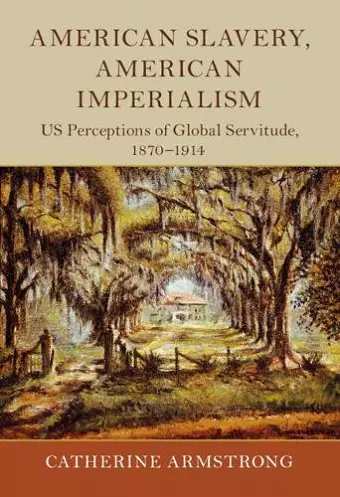American Slavery, American Imperialism
US Perceptions of Global Servitude, 1870–1914
Format:Hardback
Publisher:Cambridge University Press
Published:30th Jul '20
Currently unavailable, and unfortunately no date known when it will be back
This hardback is available in another edition too:
- Paperback£22.99(9781108701914)

Details how Americans' perceptions of the institution of slavery changed between the end of the Civil War and the onset of World War I.
Armstrong charts the legacy of slavery in the United States by tracing the representations of global slavery's victims and perpetrators in popular culture after the Civil War. In doing so, she reveals the rhetorical manoeuvres that were used to justify exploitation and forced labour both in the US and globally.Slavery casts a long shadow over American history; despite the cataclysmic changes of the Civil War and emancipation, the United States carried antebellum notions of slavery into its imperial expansion at the turn of the twentieth-century. African American, Chinese and other immigrant labourers were exploited in the name of domestic economic development, and overseas, local populations were made into colonial subjects of America. How did the U.S. deal with the paradox of presenting itself as a global power which abhorred slavery, while at the same time failing to deal with forced labour at home? Catherine Armstrong argues that this was done with rhetorical manoeuvres around the definition of slavery. Drawing primarily on representations of slavery in American print culture, this study charts how definitions and depictions of slavery both changed and stayed the same as the nation became a prominent actor on the world stage. In doing so, Armstrong challenges the idea that slavery is a merely historical problem, and shows its relevance in the contemporary world.
'This important and original interdisciplinary book sheds new light on how the US used slavery to mould its own post-war identity through the rhetorical tool of 'othering'. Wide-ranging in its theoretical and methodological scope and geographic context, Armstrong successfully draws upon diverse forms of popular culture to decipher how the nation sought to identify itself as an antislavery imperialist power between the ending of the Civil War and the onset of World War I.' Emily West, Professor of American History, University of Reading
'In this elegant and deeply-researched book, Catherine Armstrong discusses how Americans came to terms with unfree forms of labour in an era when slavery had been abolished. Overlooking the domestic persistence of unfree labour, many Americans linked the continuation of slavery around the world to non-white 'others' that in turn helped to justify the need for white imperialism. This book has powerful resonances for the analysis of modern-day slavery.' Tim Lockley, University of Warwick
'Drawing astutely on recent scholarship, Armstrong illumines how, from Reconstruction to WWI, Americans manipulated their depictions of slavery, including its perpetrators and victims, to reinforce either a conservative or progressive racial, imperial, or gendered agenda … Recommended.' J. D. Smith, Choice
ISBN: 9781108477093
Dimensions: 235mm x 160mm x 25mm
Weight: 600g
300 pages